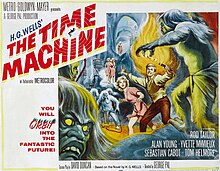This article needs additional citations for verification .(February 2024) |

In fiction, mole people are stock characters who spend their lives underground, often posing a real or potential threat to those who live on the surface. [1]
This article needs additional citations for verification .(February 2024) |

In fiction, mole people are stock characters who spend their lives underground, often posing a real or potential threat to those who live on the surface. [1]

A famous example of "mole people" who live under the ground are the Morlocks, who appear in H.G. Wells's 1895 novel The Time Machine .
Other socially isolated, often oppressed and sometimes forgotten subterranean societies, exist in science fiction. Examples include Demolition Man , Futurama (in the form of "Sewer Mutants"), C.H.U.D. , The IT Crowd , Us , Deus Ex , The Matrix and Death Line .
In Marvel comics, the Morlocks are a society of mutant outcasts, named after the subterranean race from The Time Machine , that live in the abandoned tunnels and sewers beneath New York City.
Literal races of humanoid moles in fiction include Superman and the Mole Men , The Mole People (1956), Underdog , Tarzan, Lord of the Jungle , ThunderCats , Johnny Test , and Saul of the Mole Men .
In Marvel Comics, the Moloids or Mole People are inhabitants of Subterranea, a fictional cavernous realm far beneath the Earth's surface where various species of subterranean humanoids exist. Moloids usually serve as soldiers for the Mole Man, a human from the surface world who discovered Subterranea and subsequently became ruler of the Moloids. Mole Man is frequently an antagonist of the Fantastic Four.